27 Food And Drink Superstitions From Around The World You've Probably Never Heard Of

Throughout history, cultures across the globe have developed superstitious beliefs that persevere despite scientific evidence to the contrary. Human beings tend to infer cause-and-effect relationships as occurring between unrelated events during times of heightened anxiety. These beliefs persist as a means of managing fear and stress and diminishing angst during times of social upheaval.
The occurrence of this kind of superstitious belief in the culinary realm is logical, given the centrality of food to human survival. Throughout history, humans have relied on observation and the transmission of food habits and rituals to determine what was safe and nutritious. It wasn't until the 18th century and the Age of Enlightenment that reason and science replaced superstition and faith as guideposts for survival.
As a chef with a background in cultural anthropology, I have long been fascinated with how food habits persist from generation to generation. Some food superstitions are isolated to a specific country or ethnic group, while others are cross-cultural. They are deeply rooted in ritualistic behaviors that often coincide with mythology or religious beliefs. They can move across cultures through migration and colonization. The following is a small sampling of the myriad food superstitions from around the world you've probably never heard of.
Read more: 12 Vegetables And Fruits That Used To Look Very Different
Spilling Salt Is Bad Luck

The importance of salt to cultures across the globe cannot be understated. The earliest humans established communities based on salt availability, and salt has factored heavily into political, social, and economic development worldwide. Because it is so integral to human survival, rituals and superstitions surrounding salt are ubiquitous across cultures.
The belief that spilling salt is bad luck likely has biblical origins. As portrayed in the famous oeuvre of the Last Supper painted by Leonardo Da Vinci, Judas topples a salt cellar, a reckless act considering the value of this commodity. From Germany to France to Norway to America, this tale has evolved, with various prescriptions for counteracting the bad luck brought on by the spilled salt ranging from crying to dissolve the mineral to throwing a pinch of it across one's left shoulder.
Eggs And Eggshells Are Bad Luck At Sea
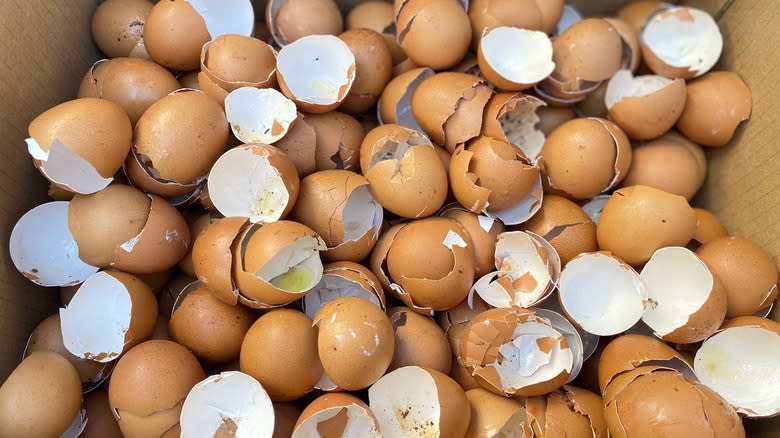
Eggs have a history of being regarded with apprehension and wonder because of their association with fertility and the life cycle. Cultures across the globe, from ancient Egypt to China, have incorporated rituals into their annual celebrations surrounding eggs, with many coinciding with springtime and agricultural practices.
One of the more sinister superstitions perpetuated across Europe in the 16th century had to do with consuming hard-boiled eggs. Believers insisted that if you did not pulverize the shells thoroughly, witches would use the eggshell halves as vessels to sail out to sea and provoke storms that would cause ships to capsize. To this day, some sailors balk at bringing eggs aboard, and if they do, they'll refer to them as "roundabouts."
Garlic Can Protect You From Evil
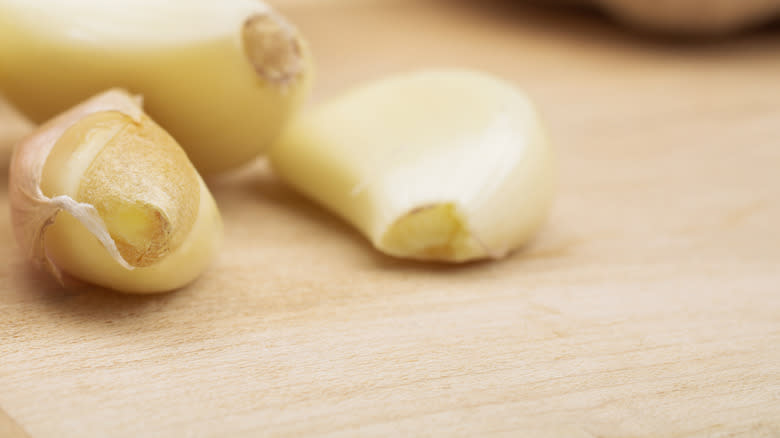
Garlic has long featured in myriad superstitions across cultures with varying religious and belief systems. Many of these superstitions involve its protectiveness against evil, danger, or harm, such as its capacity to ward off vampires. While these myths may seem random, their evolution is likely a product of observing garlic's inherent nutritional and medicinal properties, which modern medicine has since proven.
Indeed, ancient Greeks, Egyptians, Romans, and Babylonians all utilized garlic for its healing properties, particularly its antibacterial and antimicrobial components, which were first scientifically identified by Louis Pasteur in 1858. In this case, science continues to reinforce these superstitions by providing new evidence supporting the purported health benefits of the active ingredient within garlic, allicin.
Don't Put Bread Upside Down
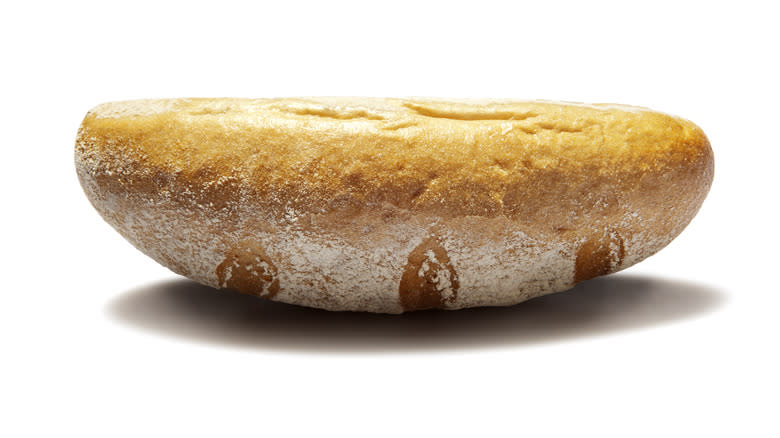
A superstition about bread should not surprise anyone, considering the centrality of this food to so many cultures. One such myth involves a loaf of upside-down bread bringing bad luck, a superstition believed by many in Italy and France, countries well known for their bread culture. In Italy, this superstition relates to the religious connection between bread and the body of Christ. An upside-down loaf of bread shows contempt for Jesus and is therefore frowned upon.
In France, this superstition is somewhat more sinister. During the Middle Ages, public executions were routine, and many were suspicious of executioners. Bakeries producing bread for executioners would leave their loaves turned upside down, indicating they were reserved for the executioners. The connection between death and upside-down bread has persisted, with many cutting the symbol of a cross onto an upside-down bread to thwart any negative luck brought on by consuming it.
Eating Soba Noodles To Ring In The New Year
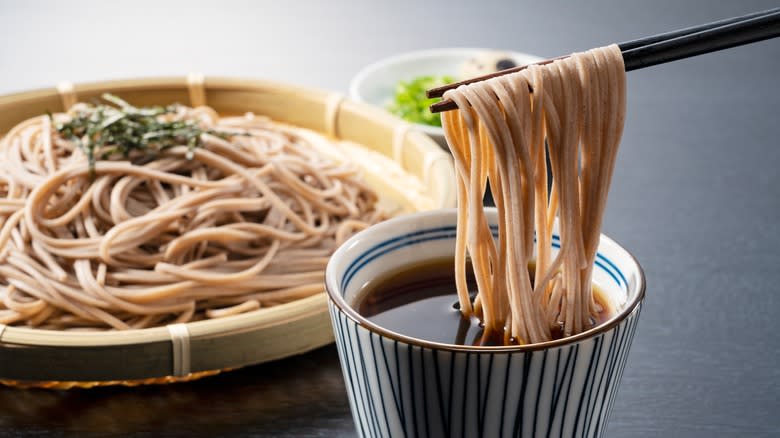
Soba are delectable, thin buckwheat noodles that are ubiquitous across Japan. Crowds of Japanese revelers line up to enjoy a bowl of Toshikoshi soba for good luck every New Year's Eve. The origin of this tradition dates back to the Edo Period, specifically the 1700s, when the noodles were introduced. Soba were affordable, fast-cooking noodles that the masses could enjoy regardless of socio-economic status. These noodles are also high in vitamins B1 and B2, necessary for combatting a common ailment of the period known as beriberi.
All of these features translated into the evolution of the superstition of consuming soba noodles to ring in the New Year. The noodles purportedly encourage a long life by their length, eliminate ill luck because of how readily they tear, and bring financial stability since the sticky noodles have been used in the past to pick up bits of gold dust. Whether the Toshikoshi soba is eaten hot or cold, Japanese citizens of all ages participate in this well-known and delicious tradition.
Spilling Coffee Brings Happiness

While spilling coffee can be a mess and cause a mean burn, according to Egyptians and many cultures across the Middle East and Turkey, doing so can bring happiness and good fortune. The origin of this superstition is believed to date back to an Egyptian palace where a servant had a case of butterfingers and would often spill coffee. His name was purportedly "Khair," Arabic for "good fortune." Each time he spilled coffee, it was literally "spilled by good fortune."
That said, do not try to invite good fortune by spilling the coffee on purpose. Doing so is not considered lucky and may upset those around you. Only accidental spillage purportedly has this superpower.
Bubbles On Your Tea Means Money Is Coming Your Way

No, we are not talking about boba or bubble tea, which contains tapioca pearls that pop when you bite down on them. In this case, we are talking about air bubbles that sometimes form after the tea has been brewed and poured into a cup. From a practical perspective, this indicates that the tea has been well-aerated, which both cools it and helps make it more flavorful.
From a superstitious perspective, these bubbles can mean several things. Most commonly, tea coated in bubbles indicates wealth. The more bubbles, the more money you will see. Additionally, bubbles around the perimeter of the cup indicate kisses, suggesting love is in the air.
Sprinkle Rice Around A New Home For Prosperity
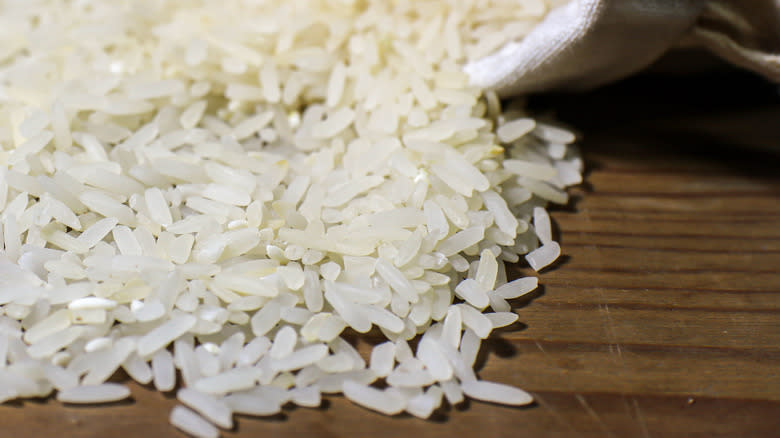
You may be familiar with the tradition of tossing rice at a newlywed couple to promote wealth and fertility. Rice can have similar influences on a new home. The tradition of disseminating rice around a new home to protect its new inhabitants began in Roman times. This superstition has persisted and extended to other cultures.
According to feng shui experts, this process helps shift the chi, or energy, within the home from negative to positive. It can be done at any time, even if the home is not new. The key is to sprinkle the rice in every room of the house and to do so while setting clear beneficial intentions. Once you have cleansed your home, you may find rice kernels randomly for the next few years. Let these be a reminder of that positive energy rather than an inconvenience.
Eat 12 Grapes At Midnight On New Year's Eve
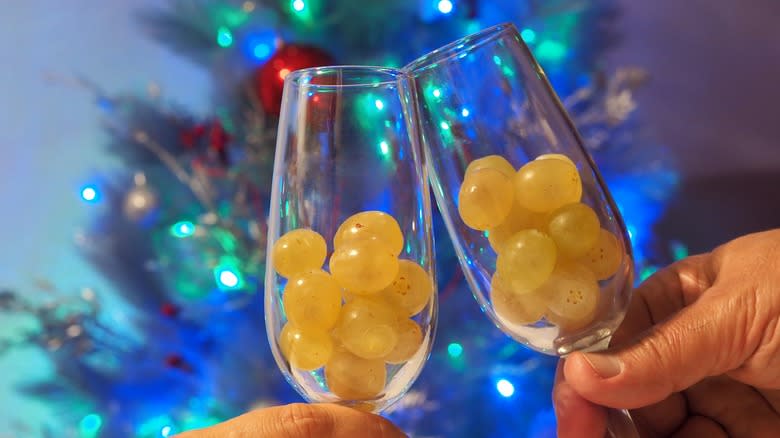
Every New Year's Eve, Spaniards engage in a curious tradition of eating 12 grapes at midnight. This tradition is known as "las doce uvas de la suerte" or "the 12 lucky grapes." This superstition is believed to date back to the 1880s and was popularized in the early 20th century during a particularly fruitful year for the grape crop in Alicante.
The tradition favors the consumption of the tiny, verdant Aledo grape, a variety protected under Denominación de Origen status. For these grapes to be lucky, they must be entirely eaten, seeds and all, before the end of the 12th bell toll at midnight. So popular is this tradition that you can purchase a can of pre-seeded grapes for this purpose at Spanish grocery stores. Some take this tradition further by consuming said grapes while wearing red underwear given to them as a gift.
Cutting The Birthday Cake

Cutting the cake for a birthday is a tradition that most of us don't even blink at, but have you ever wondered why this came to be? While the origin story is somewhat convoluted, the earliest evidence points to the ancient Greeks making cakes to celebrate birthdays and weddings. Cakes were also offered to the moon goddess Artemis. From here, the Romans took the helm, serving circular cakes to guests at events like weddings and birthdays. In the 15th century, Germans introduced the tradition of Kinderfest, a birthday celebration for children.
It wasn't until the Industrial Revolution that more modern cakes emerged that were lighter, fluffier, and layered with frosting. At this time, the British developed a practice of burying money or coins in a cake that would bring fortune when they were unearthed by cutting the cake. Today, the practice persists to honor the beginning of another year of life.
Breaking The Wishbone At Thanksgiving

Many of us salvage the turkey wishbone at Thanksgiving, dry it out, and break it in half. The superstition is that the person who gets the bigger half will have good luck, or their wish will come true. This tradition dates back to the Etruscans, who believed birds could predict the future and would make wishes upon the reserved furcula of a slaughtered chicken.
Romans continued this tradition, though they had to share the wishbone due to a lack of chickens. It was at this time that the person who obtained the larger half was the one who would enjoy the good fortune of its purported superpowers. This tradition spread from the Romans to the British, who brought it with them on the Mayflower. Since turkeys were the most prolific poultry in the New World, they became the focus of this long-held superstition.
Bananas On A Boat Are Unlucky

Bananas may be good for you, but if you enjoy sailing, you may want to skip bringing them on board. They have long been considered bad luck on seafaring vessels for myriad reasons. During the 1700s, trade ships often went missing, leaving bananas floating in the water, creating suspicions that they were connected somehow to the misfortune.
Bananas were also problematic because of their prolific production of ethylene gas. Uninformed sailors would store them alongside other provisions, which would rot. The rotten fruit had several consequences, including creating scarcity aboard the ship and igniting destructive fires that decimated the wooden vessels. Lastly, bananas were the preferred hitchhiking method for spiders, which would infest vessels, sometimes biting sailors and causing illness.
Apple Seeds Predict Love
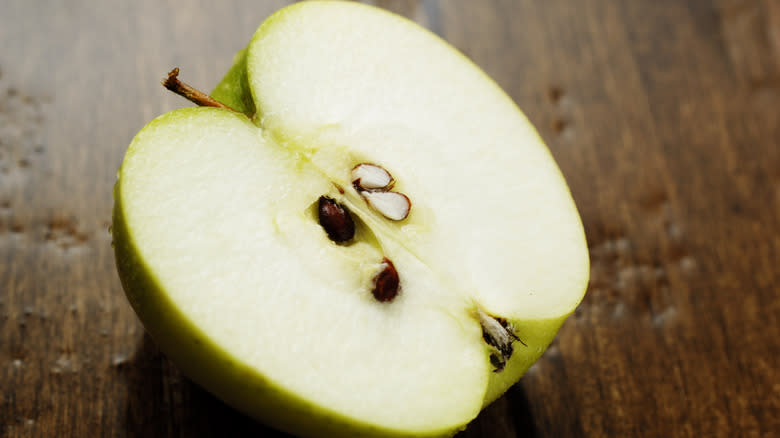
Apple seeds have several superstitious rituals associated with them. Among these are a few that involve predicting your future love life. The first suggests that if undecided between two lovers, two moist apple seeds, each named for a different suitor, should be placed upon your forehead, cheeks, or eyelids. The first one to drop off your skin indicates that its named person is not your one true love. A second tradition involves taking the seeds named for one's lovers and throwing them into a fire. This time, the first one to explode indicates the one true love.
A more complex soothsaying technique includes reserving 12 apple seeds and writing the names of 12 acquaintances on pieces of paper that get flipped over. After mixing the pieces of paper, one seed is selected along with one piece of paper, with each corresponding to a rhyme that will eventually predict whom the person will marry.
A String Of Red Chili Peppers Brings Good Luck
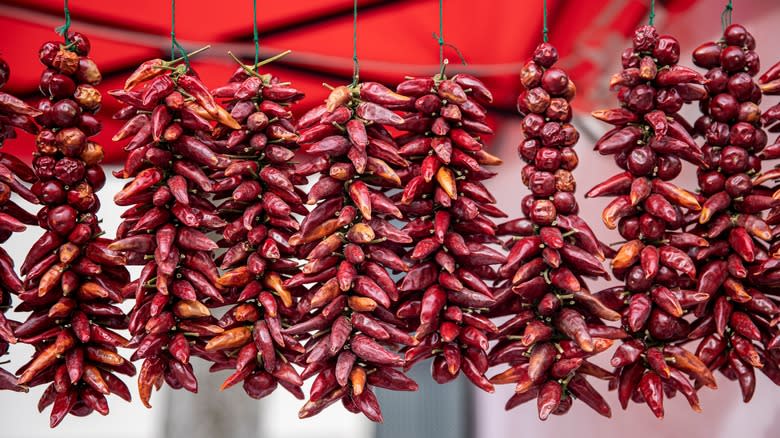
In Naples and elsewhere across Italy, strings of red chili peppers are hung about to encourage good luck. The symbolism of this tradition dates back to the Middle Ages, before chilis arrived from the New World and became prolific in the country. At this time, red symbolized good luck and protection against evil, including Satan.
A second superstition associated with chili peppers is that their heat could stop gossip in its tracks. Three characteristics give a string of chili peppers this power: they are rosso (red), rotto (broken), and regalato (gift). In other words, a gift of a string of chilis will break the flow of negative rumors perpetuated by those with ill will. Anecdotally, a similar chili tradition exists in China, where they are displayed to celebrate the Lunar New Year as a symbol of prosperity and deterring evil.
Eat Black-Eyed Peas For Good Luck In The New Year
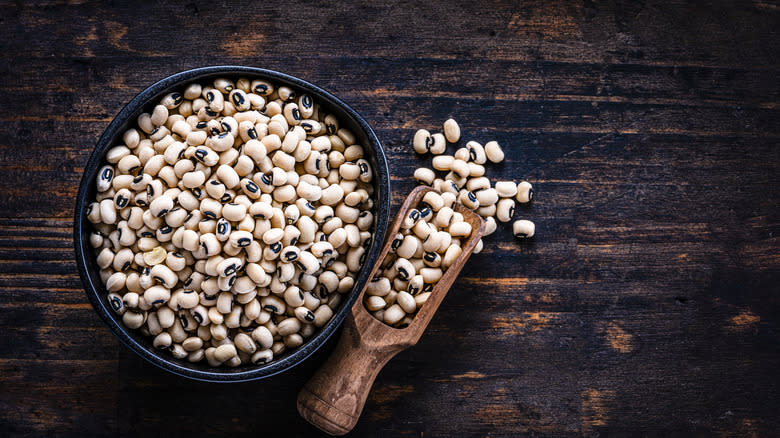
Ringing in the New Year by consuming symbolic good-luck foods occurs in cultures across the globe, and the American South's iteration involves black-eyed peas and a dish called Hoppin' John. This tradition has become so commonplace that it has spread across the U.S.
Its origins are somewhat sinister, having deep ties to the enslavement of West Africans. Indeed, black-eyed peas, a type of bean known as cowpea, were a frequent celebratory food consumed for good luck and to ward off the Evil Eye during myriad festivities and religious rituals in West Africa. Enslaved Africans brought their food traditions with them. By the 1700s, these foods became commonplace among plantation owners across the South and beyond.
Peanuts Are Bad Luck In Auto Racing
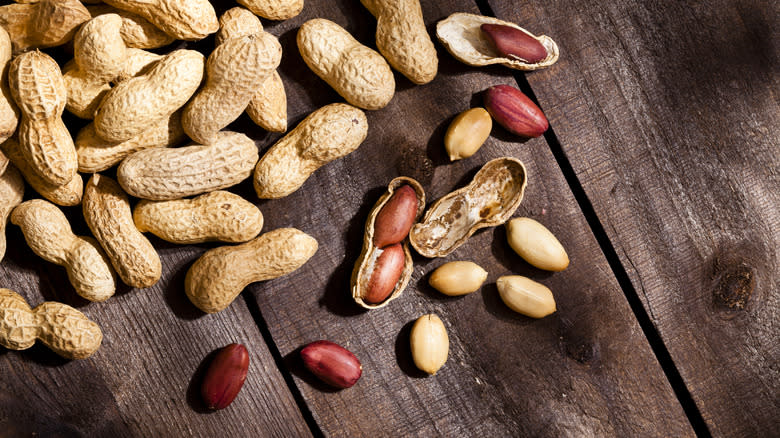
You might not escape a baseball game without consuming a bagful of in-shell peanuts, but don't dare bring them to an auto-racing event. You might just be asked to leave, especially by those who believe in the superstition that peanut shells are unlucky at races, which many do, including auto-racing legends like Dale Earnhardt Sr.
This superstition purportedly has its roots in a pair of fatal auto-racing crashes that occurred in 1937. In both instances, they found peanut shells near the vehicles involved in the accidents. Their presence led to the inference that the peanuts were connected and were somehow unlucky. Ironically, peanuts were regular race-day snack foods in that era, so whether their presence was incidental or causal is a matter of belief. That said, auto racers would rather be safe than sorry.
Oranges Are Good Luck During The Lunar New Year
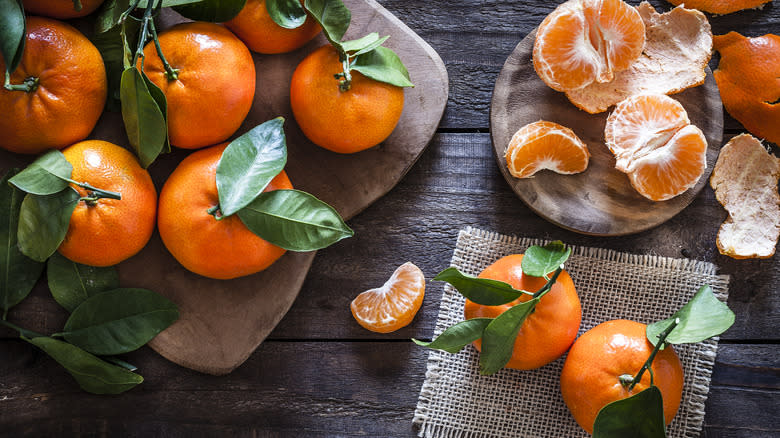
Lunar New Year celebrations are rife with symbolism and superstition, much of which involves food. One such food is the mandarin orange. It, along with other fruits, is gifted to children, accompanied by crimson envelopes containing money as a token of good luck and to ward off evil spirits.
The most likely origin of this tradition relates to what is known as "luck talk" by the Chinese, a custom of conferring symbolic meaning to words or phrases, many of which sound like one another. For example, the word for "orange" in Mandarin (ju) is a homonym for the term for "good luck" (ji). In Cantonese, "orange" and "gold" share the same word (gam). Whether you use the Mandarin or Cantonese iteration, both relate to fortune and luck.
Parsley Is An Aphrodisiac
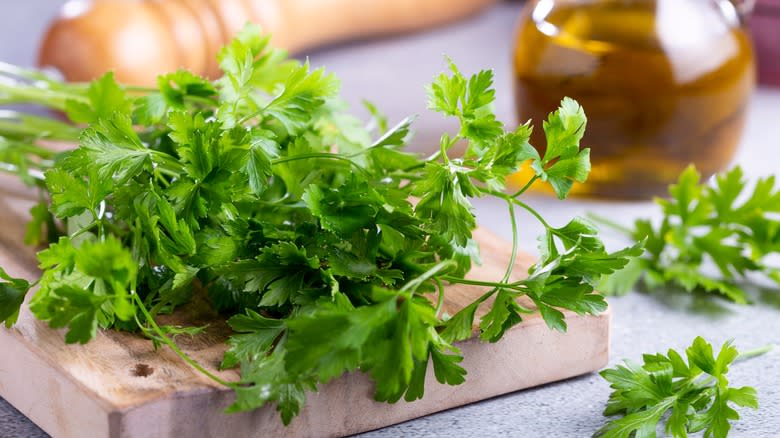
Parsley has been considered a potent superstitious herb dating back to the ancient Greeks and Romans, who often equated it with death. Despite this sinister symbolism, it later became known as an aphrodisiac and an ingredient that could boost fertility.
In some places, there was a belief that if a female planted it in her garden, she would become pregnant before it sprouted. Elsewhere, parsley was worn or used in charms to prevent one's partner from straying. And if you combined it with jasmine and placed this in your shoe, your allure would become enhanced.
Lastly, theories suggest that the historical English song "Scarborough Fair" was a recipe for an aphrodisiac -- parsley was for procreation, sage signaled reliability, rosemary was a reminder of the loved one, and thyme brought eternal devotion. Whether curly or flat-leaf, parsley spices up your love life.
Putting An Onion Under Your Bed Prevents Nightmares
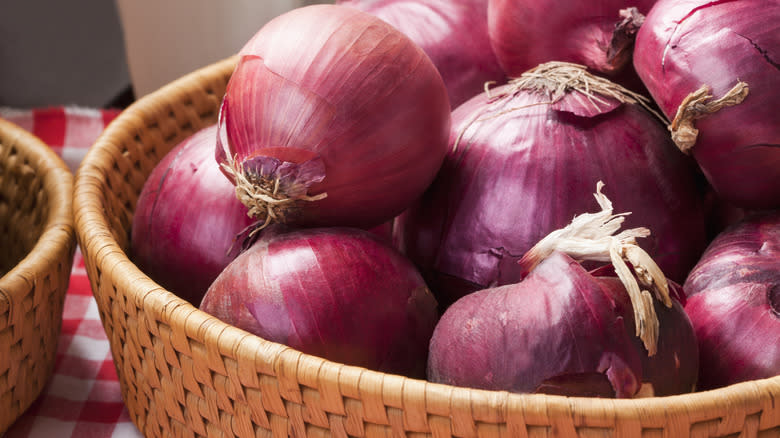
If you are prone to insomnia or suffer from nightmares, you may want to check out this superstition. It suggests that putting an onion and a knife under your bed may ward off those pesky dreams and promote more peaceful slumber. While the precise origins of this myth are unknown, there are some possible reasons it exists.
One that makes some logical sense is that the assertive aroma exuded by onions could deter insects from crawling into bed and onto you during the night. The smell might prevent you from experiencing the creepy crawlies, producing a more restful and less itchy night's sleep. It might also induce sweet dreams of a slowly simmered pot of French onion soup. While scientifically unprovable, knives are associated with protection, which may help some feel more secure while sleeping.
A Basil Plant In The Home Is Good Luck
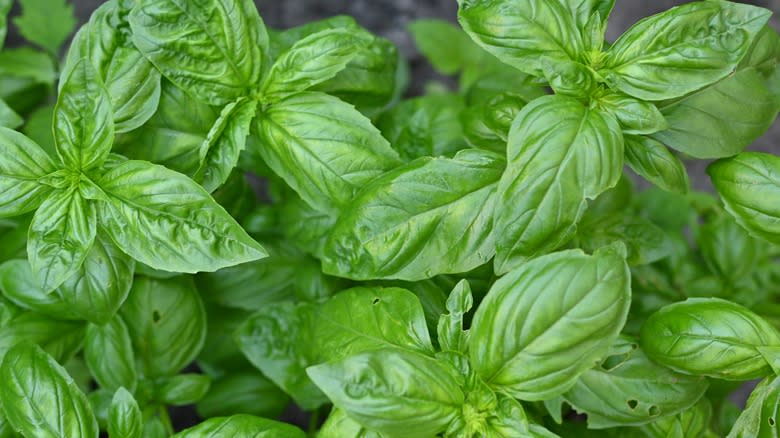
Often known as the "king of herbs," basil is highly regarded for its myriad culinary and symbolic uses by cultures across the globe. Basil is considered protective and a source of good luck within the home in many ritualistic and superstitious traditions. This belief may have originated in ancient Greece, where the plant's very name was based on the word for "king." In India, basil became synonymous with Vishnu, the god of preservation.
Whether grown in a garden, placed within the home, given to someone as a gift, or kept in a place of business, a healthy basil plant signifies prosperity, money, luck, and love. So the next time you have a bumper crop of basil, whip it into a big batch of pesto to bring fortune to all who consume it.
Pomegranates Make Women More Fertile
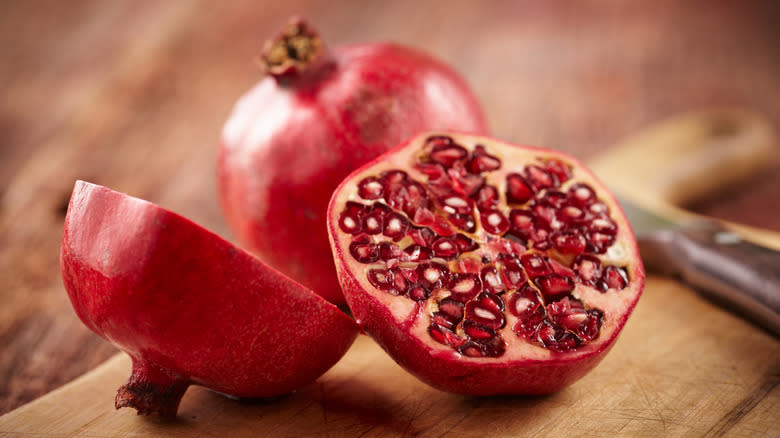
The pomegranate is among the foods with the most far-reaching and complicated symbolic traditions. From the earliest myths of ancient Greece, like that of Persephone (who is lured to the Underworld by pomegranate seeds) to monotheistic religions (where some believe it to be the biblical "Tree of Life") to literature (it appears in the tale of Romeo and Juliet), pomegranates have perplexed and impressed humans seemingly since the beginning of time.
Their dualistic capacity to hold two powers simultaneously makes pomegranates even more intriguing. They can purportedly cause both fertility and barrenness in women. Many have also long recognized their therapeutic properties, which are only now being studied and documented by the scientific community. Perhaps these medicinal capabilities were the source of their mystical value among such diverse cultures, as well as their ambiguous symbolic superpowers.
Eat Lentils For Good Luck In The New Year
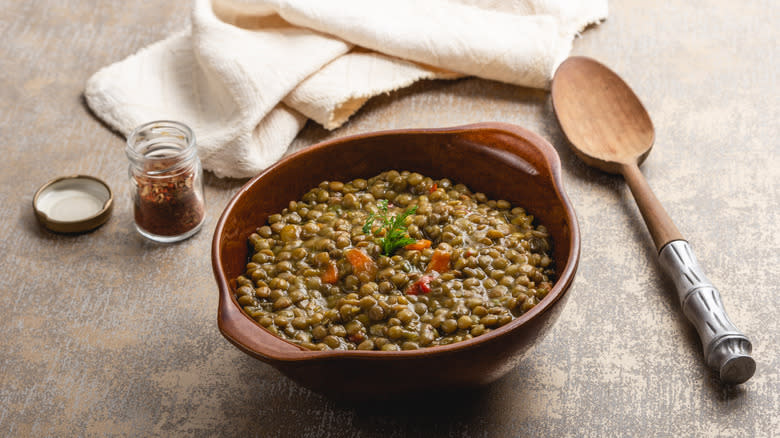
Among the foods that are considered lucky to consume in the New Year, lentils are common. They are regarded by many, from Italy to Ecuador to Hungary, as representative of good fortune and wealth because of their circular shape resembling coins and the completion of another year within the cycle of life.
A staple of culinary traditions globally, lentils have long enjoyed popularity as a food that is both affordable and nutritious. Their ubiquity and alimentary value may have encouraged the proliferation of their symbolic efficacy as a vehicle for bringing good luck to those who consume them. Another facet of lentils that features in their symbolic value is their prolific growth and capacity to double in size when cooked, both qualities associated with wealth expansion. Interestingly, lentils are frequently paired with pork for maximum acquisition of affluence in the New Year.
Pork Is Good Luck On New Year's Day

Like many other New Year's Day good-luck foods, many countries enjoy pork. It often shares the menu with similarly charmed foods, like lentils or black-eyed peas. Germans and other Eastern Europeans considered pigs lucky because they never maneuver backward, only forward. They use their snouts to root through the ground while thrusting ahead, symbolic of progress and digging luck from the earth.
In contrast, some animals are considered unlucky to consume on New Year's Day. Some consider the turkey to be chaotic, inviting conflict if consumed. Chickens tend to scratch in reverse as they peck at their food, making them more desirable to consume on New Year's Eve, when doing so symbolically puts the events of the previous year behind those eating their flesh, making way for the good fortune ahead.
If A Tortilla Puffs Up, You Will Get Married
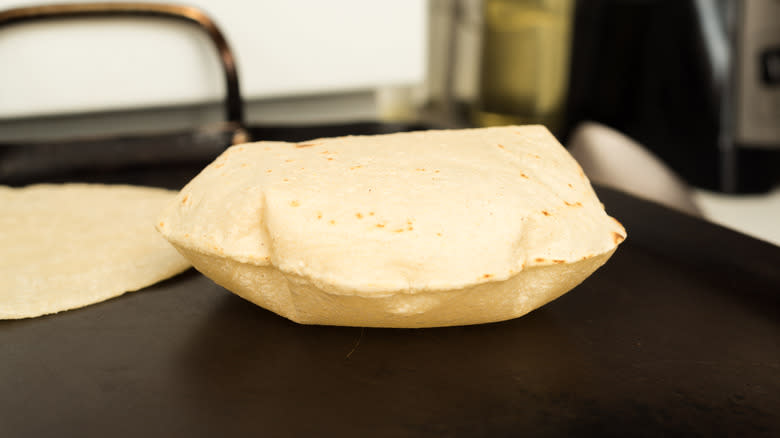
Whether formed into tamales, elotes, or tortillas, corn has been a foundational part of the diet in Mexico for thousands of years. Indeed, early Mesoamerican populations began cultivating maize as early as 3000 B.C. According to lore, indigenous populations viewed corn with such reverence that they believed the gods created man from corn.
This worship of corn has led to the development of myriad superstitions surrounding the grain, extending to the production and consumption of the tortilla. One of the most pervasive is a belief that if a corn tortilla inflates as it is laid upon the comal to cook, you will get married. Conversely, you will remain single and forced to cohabitate with your mother and father for the rest of your life if the tortilla has not inflated during the cooking process.
Lettuce Can Cause Infertility
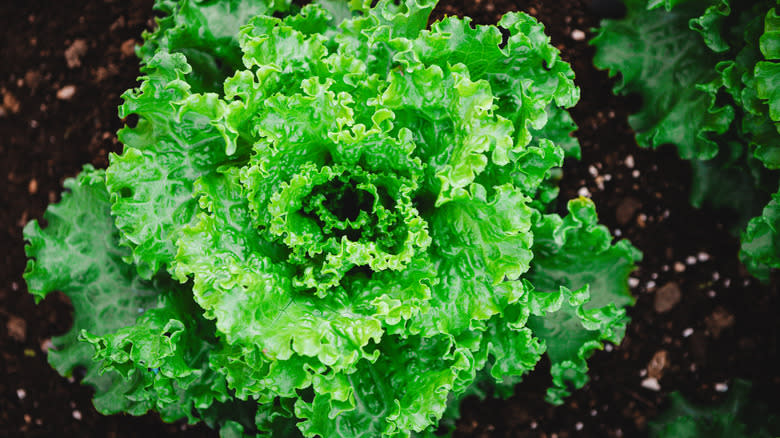
Like many foods, superstitions about lettuce are an exercise in duality, often relying on context for interpretation. Early cultivars propagated by the ancient Egyptians were tall, slender-shaped specimens. These were frequently associated with virility and seduction. Later cultivars that were more circular have been connected with the moon and femininity.
The mystical properties often associated with growing and consuming lettuce include being protective and stimulating, especially when planted around your home. However, when an overabundant crop is grown, it may result in infertility. Now may be the time to consider container gardening, allowing you to control the amount of lettuce you grow rather than allowing it to run amok.
Dab Spilled Wine Behind Your Ears For Luck

One does not need a superstition to determine that spilling wine is a bummer. Not only is it a colossal waste of money, but red wine is a disaster to clean up. Some cultures take this a step further, believing that spilling wine is not just inconvenient but also unlucky and an omen of disastrous things to come.
Italians have figured out a workaround that will thwart this impending doom. They recommend dipping your finger into the spilled wine and patting some of it behind your ears. Doing so not only counteracts the spilled wine but may portend good fortune. If this does not assuage your concerns, drink more wine. Eventually, you will forget the curse of the spilled wine, and it won't matter anymore.
Eating Lobster On New Year's Eve Is Bad Luck
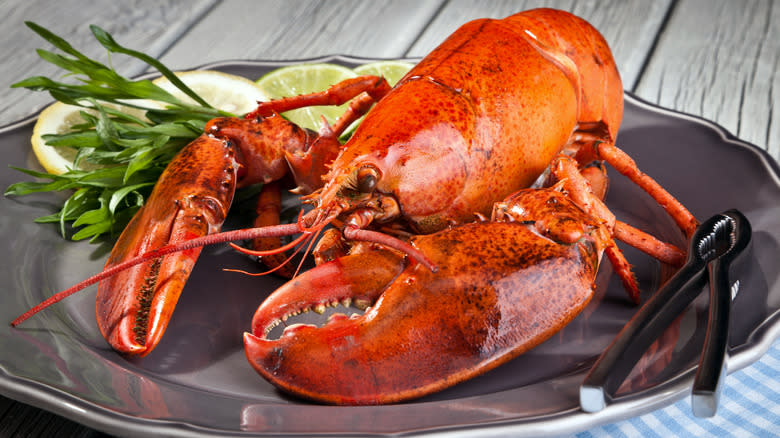
When planning your next New Year's Eve feast, it may be tempting to go all out and treat your guests to a seafood delight, thinking the lavish meal will impress those at the soirée. Unfortunately, you may be dooming your attendees to a year of misfortune and calamity according to several cultures.
The symbolism is that lobsters ambulate in reverse rather than moving forward. By ingesting this locomotion-challenged crustacean, you may halt any forward progress in your own life. A better bet for your guests would be a porcine delight of some ilk. Save the lobster for a dinner party later in the year, when the investment in your dinner will not cost your guests something far more valuable.
Read the original article on Daily Meal.

